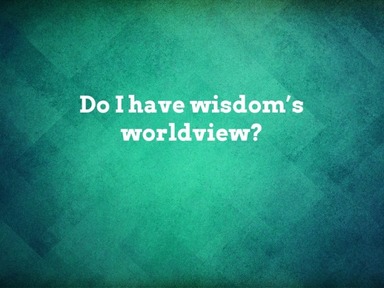Proverbs (13)

Sermon • Submitted • Presented • 45:30
0 ratings
· 33 viewsFiles
Notes
Transcript
Introduction: For many centuries, those who bear the image of our Creator have tried to answer life's big questions. We want to know what is right and wrong. We have pondered over why we exists and what brings meaning to our existence. We have attempted to discover our origins; where we came from, and how did we get here. Finally, we often consider what happens next? What happens when we die? What does the future hold?
Transition: The way in which a person answers these questions reveals how they view the world. The way we answer the questions of origin, meaning, morality, and future make up what has been labeled as a worldview. Our world view is simply the glasses we use to look at our world. It is the filter or grid that we use to interpret the information of our world. Said another way, the beliefs we hold concerning these major questions about life becomes the standard for making sense of our world.
For example, a person who holds a worldview of naturalism, believes that all matter including humans have come into existence by natural means. A naturalistic worldview answers the questions of meaning from a naturalistic perspective; life it’s simply whatever you make of it. Morality, from the natural worldview, evolves out of natural systems. The boundaries of right and wrong are what nature has set them to be, or whatever societal groups have formed and established and agreed upon. Lastly, one who views the world the through the lens of naturalism believes that when nature takes its course and you die, that is the end. You feed the worms.
Now, this isn’t any kind of new information, but the emphasis we should notice is that when a person answers these major questions form this perspective it will absolutely impact the way that person functions in the world. The way they view other people and experience relationships. The way they view work, and employment. The way they give or receive authority. The way they view medicine, travel, capitalism, democracy, politics, economy, and so on and so on.... Every person has a worldview, and every person eventually lives according to it.
Today, however, we are going to discover wisdom’s worldview. Picking back up in Proverbs chapter 8 we are going to find answers to these 4 major life questions. Let’s begin by reading the first 3 verses.
Transition: Throughout the first 9 chapters of Proverbs we have be observing the poetic conversations between father and son. We’ve noticed these division by the way he as started the talks with; “My Son”. However, we notice in chapter 8 a second time when Wisdom herself calls out. We witnessed the first of these in 1:20-33. Now, wisdom is calling again, and it’s time we should pick up the phone and listen to what she has to say! Follow with me as we get a glimpse of Wisdom’s Worldview as she calls our attention to these four big questions of life. First....
Morality
Morality
Wisdom answers the question about what is right and wrong in verses 8:4-9. (read)
Christ Connection: Wisdom leads us to Christ. The righteous word of wisdom direct us straight to Jesus. Only in Christ do we find the righteous truth of God fully satisfied. II Cor 5:21 tells us.
For our sake he made him to be sin who knew no sin, so that in him we might become the righteousness of God.
Also, in Philippians 3:8-10 we are told…
Indeed, I count everything as loss because of the surpassing worth of knowing Christ Jesus my Lord. For his sake I have suffered the loss of all things and count them as rubbish, in order that I may gain Christ and be found in him, not having a righteousness of my own that comes from the law, but that which comes through faith in Christ, the righteousness from God that depends on faith— that I may know him and the power of his resurrection, and may share his sufferings, becoming like him in his death,
Transition:
Meaning
Meaning
Wisdom answers the questions of meaning in verses 8:10-21. (read)
Christ Connection: In Christ we find great meaning and purpose for our lives. Col 3:23 tells us that… Ephesians 2:10
Whatever you do, work heartily, as for the Lord and not for men,
For we are his workmanship, created in Christ Jesus for good works, which God prepared beforehand, that we should walk in them.
Origin
Origin
Wisdom answers questions about origins in verses 8:22-31. (read)
Christ Connection: Again, Wisdom leads us to Christ in whom we discover ultimately where we all came from. Col 1:16-20 tells us…
For by him all things were created, in heaven and on earth, visible and invisible, whether thrones or dominions or rulers or authorities—all things were created through him and for him. And he is before all things, and in him all things hold together. And he is the head of the body, the church. He is the beginning, the firstborn from the dead, that in everything he might be preeminent. For in him all the fullness of God was pleased to dwell, and through him to reconcile to himself all things, whether on earth or in heaven, making peace by the blood of his cross.
Transition: When we know where we came from, we are better able to discover where we are going.
Future
Future
Wisdom offers insight into the questions of the future in verses 8:32-36. (read)
Christ Connection: Wisdom calls out. And in doing so she leads us to the most blessed future possible; salvation in Christ. Interesting, In 2 Tim 3:15 we are told..
and how from childhood you have been acquainted with the sacred writings, which are able to make you wise for salvation through faith in Christ Jesus.
Closing:
Do I have wisdom’s worldview?
Do I have wisdom’s worldview?
